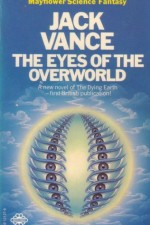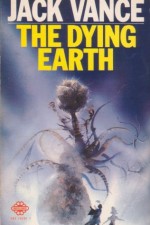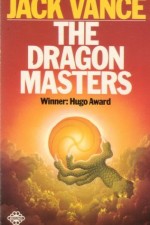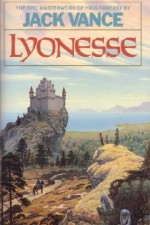Jack Vance
While Jack Vance’s passing on 26/5/13 was hardly a surprise – he was ninety-six – it still saddened me. Jack Vance might still be largely unknown outside genre circles, but he has been enormously important for me.
I picked up my first Jack Vance novel in Adelaide when I was fifteen. The Eyes of the Overworld was a slap in the face, a dash of cold water, a literary Taser. I’d literally never read anything like it. I devoured the book whole and I’ve re-read it a dozen times since. It’s a wonderful example of mature Jack Vance, a sublime construction following one of Vance’s typical trickster protagonists on a picaresque journey through a wildly imaginative world. This might sound like a thousand other generic fantasies, but Jack Vance is different – startlingly different. His characters are sardonic, often detached and aloof, with motives that are guarded and inscrutable. His prose is inimitable, full of words repurposed for lyrical effect, sentences with jagged, archaic, stylised rhythms. His writing is so carefully purposed, so distinctive, that even the shortest extract announces its creator:
Cugel was a man of many capabilities, with a disposition at once flexible and pertinacious. He was long of leg, deft of hand, light of finger, soft of tongue. His hair was the blackest of black fur, growing low down his forehead, coving sharply back above his eyebrows. His darting eye, long inquisitive nose and droll mouth gave his somewhat lean and bony face an expression of vivacity, candour, and affability. He had known many vicissitudes, gaining therefrom a suppleness, a fine discretion, a mastery of both bravado and stealth.
The whole effect is a supremely idiosyncratic creation, a joy to read and to be part of.
After this, I couldn’t get enough Vance. I sought out his Dying Earth, the precursor to The Eyes of the Overworld, and I was similarly  bowled over. Luckily for me, Jack Vance has been a prolific writer, so I had plenty to catch up on. I found The Dragon Masters, his Demon Prince series, the Cadwal series. I was given a copy of The Languages of Pao, his fascinating exploration of the Sapir–Whorf hypothesis where languages determine national characteristics. I tracked down his short stories – read ‘The Moon Moth’ and prepared to be astonished.
bowled over. Luckily for me, Jack Vance has been a prolific writer, so I had plenty to catch up on. I found The Dragon Masters, his Demon Prince series, the Cadwal series. I was given a copy of The Languages of Pao, his fascinating exploration of the Sapir–Whorf hypothesis where languages determine national characteristics. I tracked down his short stories – read ‘The Moon Moth’ and prepared to be astonished.
When he began his masterly Lyonesse trilogy, I was lining up for it – and not disappointed. Many of his earlier  works were short stories or novellas, in truth. The Lyonesse trilogy gave Vance elbow room. The result is elegiac, lyrical, playful, discursive, confronting, melancholic and wistful, a book series to read and re-read again and again.
works were short stories or novellas, in truth. The Lyonesse trilogy gave Vance elbow room. The result is elegiac, lyrical, playful, discursive, confronting, melancholic and wistful, a book series to read and re-read again and again.
Jack Vance is a truly great writer, but one who is appallingly neglected by those unfamiliar with the best that genre can offer. Sometimes this inspires an unhealthy feeling of glee – ‘We have him to ourselves!’ – but more often I’m dismayed that the rest of the reading world is missing out on the work of this extraordinary artist.

Thanks for this Michael. I love it when a writer makes me want to read another writer I’ve never thought about. I didn’t know anything about Jack Vance and I’ve read quite a lot of classic SF though there are great gaps too. Reevaluation of our elders and of masters of form and genre is so important. We get too caught up in the onrush of the contemporary. It’s sobering to read, say, Orwell’s essays on 30s literature and see how unknown the big names then are now.
You’re right, Claire – we are often seduced by contemporary stuff. The cult of recency? Some historical perspective is a good thing. Jack Vance wrote during some of the great periods of popular SF/F, and was a titan. I have a feeling, too, that his work might survive better than some of the other giants of the genre, simply because of its individuality. It’s due to his prose, which I hope I highlighted in my brief thoughts above. Unique.
Hear hear, well said sir!
I wore out my first set of the Lyonesse paperbacks, and my second set are starting to reach the end of their effective asset life too. I re-read that and the Dying Earth books more often than I re-read LoTR.
Stephen, JV has music in his words, and his writing is unlike any other. And prolific – goodness me. There’s lots of great Vance stuff out there, but it can be hard to find.
Agreed that it can be hard to find- some have been reprinted relatively recently thankfully, other titles will require much more effort to locate. The correct sort of second-hand bookshop (old, dusty and with perhaps three times as many books as shelving to house them) is becoming very rare nowadays. The proprietors of these sorts of shops often have a little of Cugel’s spirit…